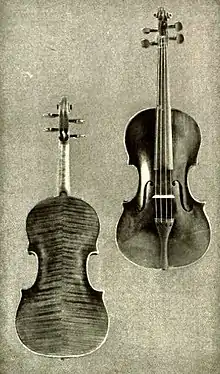Lipinski Stradivarius
The Lipinski Stradivarius is an antique violin constructed in 1715 by the Italian[1] luthier Antonio Stradivari of Cremona, during Stradivari's "golden period" between 1700 and 1725. There are fewer than 650 extant Stradivarius violins in the world today, and the Lipinski is considered to be a particularly fine example.[2] In 2012, it was appraised at US$5 million.[3]

History
The earlier history of The Lipinski is unclear; Italian violinist and composer Giuseppe Tartini is the first reputed owner. Tartini, who in 1713 experienced a dream in which he allowed the devil to play his violin, heard a beautiful sonata which he was unable to compare with anything he had ever heard. Tartini, two years later, tried to reproduce the sound in his Devil's Trill Sonata.
Lipinski
Tartini presented the violin to his pupil, Signor Salvini. According to a reminiscence of a certain von Krockow, who met the Polish violinist Karol Lipiński in Dresden in 1849, the young Lipinski, provided with a letter of recommendation from Louis Spohr, met Salvini in Milan, probably at the end of his concert tour (1817–18). After Lipinski performed for Salvini, the teacher asked to see his violin, which he then smashed to pieces against the corner of a table. Salvini handed the shocked Lipinski the Stradivarius: "...as a gift from me, and, simultaneously, as a commemoration of Tartini."[4]
Post-Lipinski
Following Lipinski's death, the violin passed through numerous collections enumerated by Herbert Goodkind,[5] until it came into the possession of Dr José Martinez Cañas, Havana, Cuba.[6]
Contemporary ownership
In 1962, the Lipinski Stradivarius was sold to Rosalind Elsner Anschuetz of New York City, for US$19,000. Anschuetz gave the violin to her daughter-in-law, Estonian violinist Evi Liivak, and upon her death in 1996, Liivak's husband, Richard Anschuetz, took possession of the instrument. After Anschuetz moved to the Milwaukee, Wisconsin area, the violin was stored in a local bank vault. Upon Anschuetz' death in February 2008, ownership of the violin passed to an anonymous family member, who lent the Lipinski to Milwaukee Symphony Orchestra concertmaster Frank Almond.[7]
2014 theft
On January 27, 2014, a Monday, at around 10:20 pm (22:20 CST), Almond was assaulted with a Taser, and the violin, including two bows, was stolen during an armed robbery in a parking lot in the rear of Wisconsin Lutheran College on West Wisconsin Avenue. Almond had just performed at Wisconsin Lutheran as part of his "Frankly Music" series.[8]
On 31 January 2014, a US$100,000 reward was announced for the return of the violin. Milwaukee police worked with international police organizations on recovery efforts. The original getaway vehicle and violin case were both found a short time after the original attack, which appeared to have been carefully planned in advance.[9]
Three suspects were arrested by Milwaukee police on February 3, 2014.[3] On February 6, 2014, Milwaukee Police Chief Edward Flynn announced that the violin had been recovered.[10]
On 13 October 2018, in a piece titled A Violin’s Life Almond told the story of his encounters with the violin including its theft and recovery live on stage at an event in New York City for The Moth.[11]
Provenance
- Giuseppe Tartini
- Signor Salvini, Milan
- Karol Lipiński
- Richard Weichold, instrument dealer, Dresden, 1861
- Engelbert Röntgen, Leipzig
- owner not known
- W. E. Hill & Sons, instrument dealers, London, 1899
- Unknown amateur musician, Holland
- Hill & Sons, instrument dealers, London
- owner not known
- Hamma, instrument dealers, Germany
- Unknown
- Wurlitzer, New York, 1922
- Alfredo de Saint Malo, 1927
- Roger Chittolini
- José Martínez Cañas, Havana, 1941
- Wurlitzer, instrument dealers, New York, 1960
- Rosalind Elsner Anschuetz / Richard Anschuetz, Evi Liivak, 1962
- Anonymous Anschuetz family member, Milwaukee, 2008
Joseph Joachim, Liivak, Malonzenoff, and Persinger are also known to have possessed the Lipinski Stradivarius.
See also
References
- Beare, Charles (1980). "Antonio Stradivari". The New Grove Dictionary of Music and Musicians. Vol. 18. London: Macmillan. p. 193. ISBN 1-56159-174-2.
Italian maker of violins and other instruments.
- Kozinn, Allan; Yaccino, Steven (Jan 30, 2014). "A Violinist's Triumph Is Ruined by Thieves". The New York Times. Retrieved Feb 6, 2014.
- Luthern, Ashley; Higgins, Jim; Vielmetti, Bruce (February 5, 2014). "Three suspects arrested, but stolen Stradivarius violin not recovered". www.jsonline.com. Milwaukee Journal Sentinel. Archived from the original on 8 February 2014. Retrieved 2014-02-06.
- Articles in The Violin Times 1895 and 1896, reported by Krzysztof Rottermund "Stradivari, Guarneri and Amati: a history of Karol Lipiński's violins" in Maya Trochimczyk, ed. A Romantic Century in Polish Music (tr. by Trochimczyk from Polish) 2009, pp79f; Rottermund convincingly dismisses a rival provenance from another pupil of Tartini.
- "Tarisio". cozio.com. Archived from the original on 2014-02-22.
- Rottermund 2009 p.
- Tom Strini (2008-09-06). "Encore for a Stradivarius". Milwaukee Journal Sentinel. Archived from the original on 2008-09-10. Retrieved 2008-09-06.
- Garza, Jesse; Higgins, Jim (28 January 2014). "'Priceless' Stradivarius violin stolen in armed robbery in Milwaukee". Milwaukee Wisconsin Journal Sentinel. Archived from the original on 30 January 2014. Retrieved 2023-03-10.
- Luthern, Ashley (31 January 2014). "$100,000 reward announced in violin theft". Milwaukee Wisconsin Journal Sentinel. Archived from the original on 1 February 2014. Retrieved 2023-03-10.
- "Two Milwaukee men charged in theft of Stradivarius violin". www.jsonline.com. Retrieved 2023-03-10.
- Frank Almond (Oct 13, 2018). A Violin’s Life (Podcast). New York City: The Moth. Event occurs at 14:44.
Further reading
- Faber, Toby (2004). Stradivarius: Five Violins, One Cello and a Genius. London: Macmillan. ISBN 0-333-98976-7.
- Doring, Ernest N. (1999). How Many Strads? Our Heritage from the Master. Chicago: Bein & Fushi, Inc. OCLC 13966919.
External links
- Lipinski Stradivarius in the Cozio Archive at tarisio.com
- The Lipinski (2016), a short film by Fourth City.